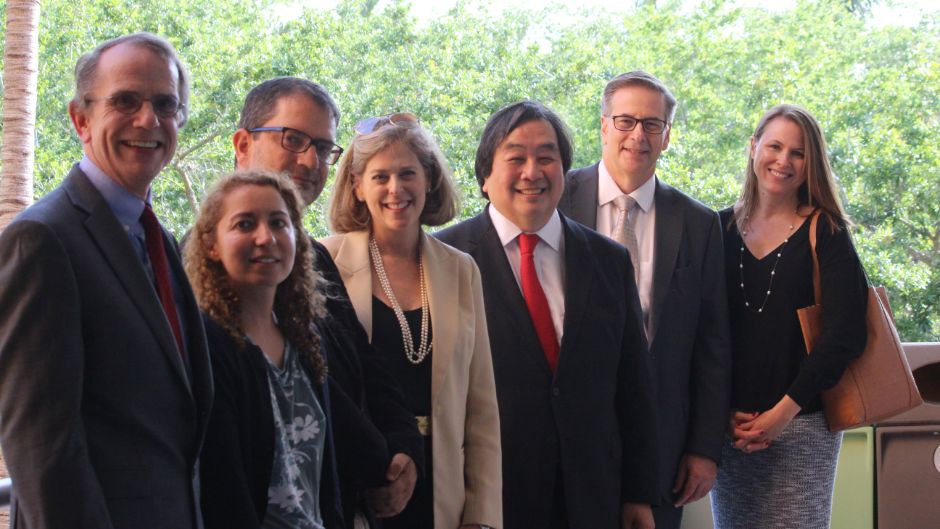On Thursday, March 31, 2022, the University of Miami School of Law hosted one of the country’s leading experts in public and private international law, national security law, and human rights, Yale Law Professor Harold Koh. Koh was the speaker for the Law School’s Ninth Annual Louis Henkin Lecture on Human Rights in honor of the late Louis Henkin. Koh described “Lou” and Alice Henkin as “the Franklin and Eleanor Roosevelt of their time,” when highlighting their pioneering career in human rights.
The lecture, “Inside the Biden Administration’s Human Rights Challenge,” featured Koh’s own trailblazing career as a human rights lawyer and legal scholar, and more recently, as Legal Adviser of the U.S. Department of State during the Obama administration. Koh was also one of a group of lawyers who filed suit against Russia on March 7 at the International court of Justice in the Hague.
Throughout the lecture, Koh reflected on the human rights challenges that current and previous administrations are facing. The lecture was structured in four parts and examined President Biden’s foreign policy doctrine in contrast with President Trump’s approach and explored what this might mean for Russia’s invasion of Ukraine, among other pressing human rights challenges.
The first part of the lecture examined the question of whether a Biden Doctrine governing foreign policy exists. Koh described the “Biden Approach” as engaging with allies, applying the “spirit of the law”, and working to find long term solutions, while the “Trump Approach” revolved around putting America first with no visible strategy for multilateral solutions.
Second, the lecture explored Biden’s transition plan and early days in the administration. Professor Koh discussed the current administration’s challenge of strengthening democracy at home and abroad during an era of growing authoritarianism. The strategy during the early days of the administration placed human rights at the center of foreign policy, focusing on diplomacy and democracy, and on “reversing (what the Trump Administration did), reengaging (in foreign policy affairs), rebuilding, and reconceptualizing.” This approach entailed steps such as ending the Muslim ban, allowing transgender citizens to serve in the military, rejoining the WHO (World Health Organization), rejoining the Paris Climate Agreement, telling the truth, ending the war in Afghanistan, and strengthening global health and security.
Third, Koh discussed the challenges human rights crises throughout the world pose for U.S. foreign policy. He discussed the war in Afghanistan, the Southern border crisis, and the “Haiti Paradigm” as an example of what happens when large states fail to address the root causes of problems in neighboring states. More specifically, Koh highlighted the importance of addressing violations of the human rights to health and food. Koh concluded this part of his presentation by arguing that President Biden’s Kantian global governance approach has advanced the resolution of these crises.
Lastly, the lecture described the role of the Biden administration in Russia’s invasion of Ukraine. Koh briefly described the events leading up to a full invasion and the role international law has played in the conflict. He discussed the efforts leading to a successful decision in the case of Ukraine v. Russian Federation before the International Court of Justice, as well as challenges with enforcement. Koh concluded by highlighting Biden’s actions to support Ukraine, defend NATO (North Atlantic Treaty Organization), turn up sanctions, and welcome Ukrainian refugees among others.
The event ended with Koh’s reflections on Biden’s continuing challenges, such as ending the Covid crisis at home and around the globe, implementing solutions to climate change, the stance on Ukraine, and addressing economic and racial injustice. He closed the session by stating that “joining the international law army of Lou and Alice Henkin” is key to addressing today’s U.S. foreign policy challenges.
Read about Miami Law's Human Rights Law Program

